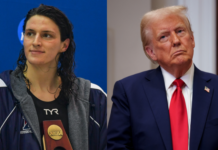Ladies and gentlemen, let’s dive into the latest legal drama involving former President Donald Trump! On Monday, the Supreme Court handed down a significant ruling in the case of Trump v. United States, addressing the scope of a former president’s immunity from prosecution for actions taken while in office.
In a 6-3 decision, the Supreme Court determined that a former president has substantial immunity from prosecution for official acts committed during their presidency but not for unofficial acts. This ruling, however, does not directly apply to whether Trump is immune from prosecution related to his efforts to overturn the 2020 election results.
Chief Justice John Roberts, writing for the majority, clarified that while the president enjoys no immunity for unofficial acts, Congress cannot criminalize actions taken by the president in carrying out constitutional responsibilities. “The President is not above the law,” Roberts wrote, “but the system of separated powers designed by the Framers has always demanded an energetic, independent Executive.”
This decision came in the context of Special Counsel Jack Smith’s investigation into Trump’s involvement in the January 6 Capitol riot and alleged interference in the 2020 election. Trump has pleaded not guilty to charges including conspiracy to defraud the United States and obstruction of an official proceeding.
The Court’s ruling emphasized that a president may not be prosecuted for exercising core constitutional powers and is entitled to presumptive immunity for official acts. However, Justice Sonia Sotomayor, joined by Justices Elena Kagan and Ketanji Brown Jackson, dissented, arguing that the decision undermines the principle that no one is above the law. “Our Constitution does not shield a former President from answering for criminal and treasonous acts,” Sotomayor asserted.
Justice Jackson in her dissent: “At the end of a momentous Term, this much is clear: The tsunami of lawsuits against agencies that the Court’s holdings in this case and Loper Bright have authorized has the potential to devastate the functioning of the Federal Government.”
— Katie Phang (@KatiePhang) July 1, 2024
Others aren’t happy about the majority ruling either.
In other words, the conservative activist judges are carrying out project 2025 from the bench!
— UrbanistaRamon (@UrbanistaRamon) July 1, 2024
Jackson, dissenting, also points out that today’s decision effectively makes last week’s reversal of Chevron retroactive, unleashing endless attacks on agency regulations that had been seemingly settled over the last four decades. https://t.co/qhqNwBmmxa pic.twitter.com/pbe4PItLbz
— Mark Joseph Stern (@mjs_DC) July 1, 2024
Justice Clarence Thomas, in a concurring opinion, raised additional concerns about the appointment of Jack Smith as special counsel, questioning the constitutionality of such an appointment without clear congressional authorization.
“If there is no law establishing the office that the Special Counsel occupies, then he cannot proceed with this prosecution. A private citizen cannot criminally prosecute anyone, let alone a former President,” he said.
“[T]here are serious questions whether the Attorney General has violated that structure by creating an office of the Special Counsel that has not been established by law. Those questions must be answered before this prosecution can proceed. We must respect the Constitution’s separation of powers in all its forms, else we risk rendering its protection of liberty a parchment guarantee,” he concluded.
Former President Trump, in an exclusive interview with Fox News Digital, celebrated the ruling as a victory. “I have been harassed by the Democrat Party, Joe Biden, Obama, and their thugs for years, and now the courts have spoken,” Trump said. “This is a big win for our Constitution and for democracy. Now I am free to campaign like anyone else.”
The ruling has broad implications for the presidency, as highlighted during the Court’s arguments. Justice Samuel Alito warned of the potential destabilizing effects if former presidents face criminal prosecution from political opponents. Meanwhile, Justice Ketanji Brown Jackson expressed concern that immunity could embolden future presidents to commit crimes without fear of consequence.
The Supreme Court’s decision marks a pivotal moment in the legal battles surrounding former President Trump, setting a precedent that will influence future presidencies. As Trump continues to lead in polls for the 2024 presidential race, this ruling underscores the ongoing tension between legal accountability and executive authority.
Without immunity, the President of the United States is unable to properly serve the American people and defend our nation.
In today’s precedent-setting, 6-3 decision, the Supreme Court did right by President Trump, they did right by the American people, and they did right by… pic.twitter.com/vXskn6qL2q
— Byron Donalds (@ByronDonalds) July 1, 2024
Stay tuned, folks, because this decision’s implications will reverberate through the political landscape for years to come.







